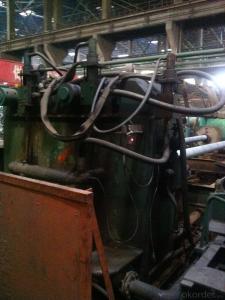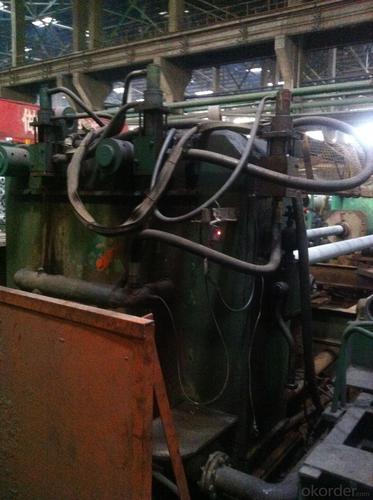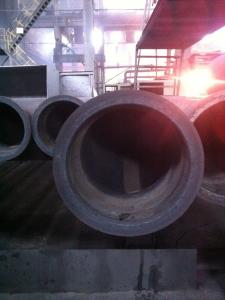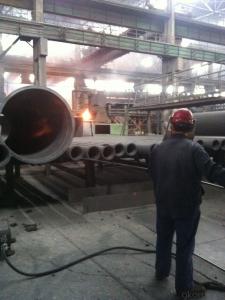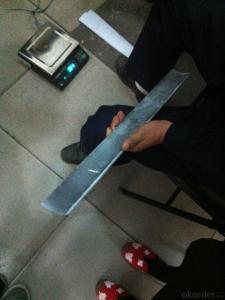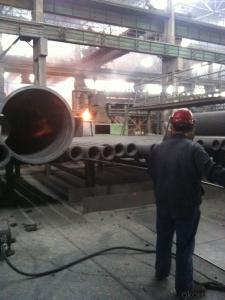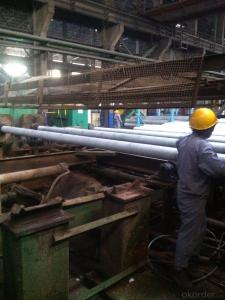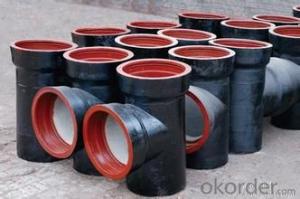DUCTILE IRON PIPE AND PIPE FITTINGS K9 CLASS DN1000
- Loading Port:
- Tianjin
- Payment Terms:
- TT OR LC
- Min Order Qty:
- 23 pc
- Supply Capability:
- 3000 pc/month
OKorder Service Pledge
OKorder Financial Service
You Might Also Like
Material : Ductile Cast Iron
Size Range : DN 80mm to DN 2000mm
Unit Effective Length : 6m or 5.7m
Manufacture Standard: ISO 2531:1998/ EN 545:2006/EN 598:2007
Annual capacity : 200,000 tons
Coating Exterior: Zinc 130g/m2 according to ISO 8179-1 and bitumen coating 70 microns.
Cement Interior: Portland Cement/ High Alumina Cement/ Sulphate Resisting Cement Lining according to ISO 4179
Special requirements on external coating and internal lining can be applied
We also provide accessories such as SBR/EPDM rubber gaskets, lubricant paste, pipe caps, PE sleeves, etc.
Additional Parts:
Each pipe is strictly inspected according to related standard to ensure permanently high performance.
Easy Installation at site and service free for life
Long Service Lifespan
Quotation will arrive you within 24hours once we get your inquiry.
We guarantee offering you a competitive price.
A copy of original inspection reports of pipes will be offered after shipment.
Photos of loading process will be sent to the customer after shipment effect.
We will follow-up the delivery progress after shipment effect and update to the customer on weekly basis.
- Q: What are the different types of coatings available for ductile iron pipe?
- The different types of coatings available for ductile iron pipe include cement mortar lining, polyethylene sleeving, polyurethane coatings, and epoxy coatings. Each coating offers specific benefits such as corrosion resistance, improved flow characteristics, and protection against external elements.
- Q: Can ductile iron pipes be used for underwater installations?
- Indeed, underwater installations can make use of ductile iron pipes. Ductile iron, renowned for its robustness and longevity, exhibits a remarkable resistance to corrosion, rendering it well-suited for submerged applications. Moreover, the exceptional joint integrity of ductile iron pipes guarantees their impermeability, even when subjected to substantial hydrostatic pressure. To bolster their resistance to corrosion and prolong their lifespan in underwater settings, these pipes are often coated with protective linings and coatings. All in all, ductile iron pipes are a dependable option for underwater installations due to their formidable strength, durability, and corrosion resistance attributes.
- Q: Are ductile iron pipes suitable for use in irrigation gate systems?
- Yes, ductile iron pipes are suitable for use in irrigation gate systems. Ductile iron is a type of cast iron that has enhanced strength and flexibility, making it a durable and reliable choice for applications such as irrigation gate systems. Ductile iron pipes are known for their high tensile strength and resistance to corrosion, which is important for maintaining the integrity of the irrigation system. Additionally, ductile iron pipes have the ability to withstand high pressure and provide a long service life, making them a cost-effective solution for irrigation gate systems. Overall, ductile iron pipes are well-suited for use in irrigation gate systems due to their strength, durability, and resistance to corrosion.
- Q: Can ductile iron pipes be used in areas with high soil acidity?
- Ductile iron pipes can be used in areas with high soil acidity, but certain precautions should be taken to ensure their longevity and performance. Ductile iron pipes are known for their strength, durability, and resistance to corrosion, which makes them suitable for various soil conditions, including those with high acidity. However, high soil acidity can still pose a potential risk to ductile iron pipes over time. Acidic soils can accelerate the corrosion process, potentially leading to the degradation of the pipe material. To mitigate this risk, several measures can be implemented: 1. Protective Coatings: Applying protective coatings to the outer surface of the ductile iron pipes can provide an extra layer of defense against soil acidity. These coatings, such as epoxy or polyethylene, act as a barrier, preventing direct contact between the pipe and the corrosive soil. 2. pH Adjustment: Adjusting the pH levels of the soil can help reduce its acidity. This can be done by adding lime or other neutralizing agents to the soil, which will help create a more favorable environment for the ductile iron pipes. 3. Cathodic Protection: Implementing cathodic protection systems can be an effective method to prevent corrosion in ductile iron pipes. This technique involves the use of sacrificial anodes or impressed current systems to create a protective electrical current that counteracts the corrosive effects of the soil. 4. Regular Inspections: Periodic inspections should be conducted to monitor the condition of the ductile iron pipes in areas with high soil acidity. This allows for early detection of any corrosion or degradation, enabling timely repairs or replacements to be carried out. By implementing these measures, ductile iron pipes can be effectively used in areas with high soil acidity, ensuring their long-term performance and minimizing the risks associated with corrosive soils. However, it is always recommended to consult with experts or engineers familiar with local soil conditions and the specific requirements of the project to determine the most suitable materials and protective measures.
- Q: What is the expected thermal expansion coefficient of ductile iron pipes?
- The expected thermal expansion coefficient of ductile iron pipes varies depending on several factors, including the specific composition of the iron and the temperature range in which the pipes are being used. However, as a general guideline, the thermal expansion coefficient of ductile iron pipes typically falls within the range of 10 to 14 x 10^-6 per degree Celsius (10-14 μm/m°C). This means that for every degree Celsius increase in temperature, a ductile iron pipe will expand by approximately 10 to 14 micrometers per meter of length. It is important to note that these values are approximate and may vary depending on the specific conditions and application of the pipes.
- Q: Can ductile iron pipes be repaired if they are damaged?
- Yes, ductile iron pipes can be repaired if they are damaged. The extent of the damage will determine the type of repair that is needed. In cases where the pipe is cracked or has small holes, a repair clamp or a stainless-steel sleeve can be used to seal the damaged area. These methods provide a temporary fix and allow for the flow of water to continue until a more permanent repair can be made. For more severe damage, such as large cracks or broken sections, a full replacement may be necessary. This involves cutting out the damaged section of the pipe and installing a new piece. This process requires specialized equipment and expertise, but it can effectively restore the functionality of the pipe. It is important to note that the repair of ductile iron pipes should be carried out by trained professionals who have experience in working with this type of material. This ensures that the repairs are done correctly and do not compromise the integrity and safety of the pipeline system. Regular inspection and maintenance of ductile iron pipes can help identify any potential issues early on and prevent extensive damage that may require replacement rather than repair.
- Q: What is the average weight of ductile iron pipes?
- The average weight of ductile iron pipes varies depending on their size and specifications. Generally, ductile iron pipes can range in weight from a few hundred pounds to several tons per linear foot.
- Q: What is the minimum cover requirement for ductile iron pipes?
- The specific project or engineering design considerations typically determine the minimum cover requirement for ductile iron pipes. However, as a general rule, it is often recommended to have a minimum cover requirement of at least 2 feet (or 0.6 meters) from the top of the pipe to the finished ground surface. This recommendation helps protect the pipe from external loads, soil settlement, and potential damage during construction activities. Additionally, it contributes to the long-term structural integrity and durability of the ductile iron pipe system. It is crucial to consult local building codes, industry standards, and project specifications for accurate and up-to-date information on specific minimum cover requirements.
- Q: Can ductile iron pipes be used in oil or gas transmission pipelines?
- Ductile iron pipes are applicable for oil or gas transmission pipelines. They belong to the cast iron category and possess enhanced characteristics, including increased tensile strength and ductility. These properties make them suitable for various applications, including pipeline systems used in oil and gas transmission. The corrosion resistance of ductile iron pipes is exceptional, which is crucial for pipelines that transport oil or gas over long distances. This material exhibits a high resistance to external factors such as soil chemicals, moisture, and corrosive gases commonly found in the oil and gas industry. Moreover, ductile iron pipes can endure high pressures and temperatures, making them suitable for the demanding requirements of oil and gas transmission. Moreover, ductile iron pipes have excellent impact resistance, enabling them to absorb and withstand external forces such as ground movement or heavy loads. This durability ensures the integrity and longevity of the pipeline system, minimizing the risk of leaks or failures. In summary, ductile iron pipes provide a reliable and cost-effective solution for oil and gas transmission pipelines. Their robustness, corrosion resistance, and ability to withstand high pressures and temperatures make them a viable choice for this critical infrastructure.
- Q: Are ductile iron pipes suitable for potable water applications?
- Yes, ductile iron pipes are suitable for potable water applications. Ductile iron pipes have been used in water distribution systems for many years and have proven to be reliable and durable. They are highly resistant to corrosion, which is important for maintaining the quality of potable water. Ductile iron pipes also have a high tensile strength, making them less prone to breakage or leakage. Additionally, they have a smooth interior surface that helps in maintaining water flow and preventing the buildup of deposits or contaminants. Overall, ductile iron pipes are a suitable choice for potable water applications due to their strength, durability, and corrosion resistance.
Send your message to us
DUCTILE IRON PIPE AND PIPE FITTINGS K9 CLASS DN1000
- Loading Port:
- Tianjin
- Payment Terms:
- TT OR LC
- Min Order Qty:
- 23 pc
- Supply Capability:
- 3000 pc/month
OKorder Service Pledge
OKorder Financial Service
Similar products
Hot products
Hot Searches
Related keywords
